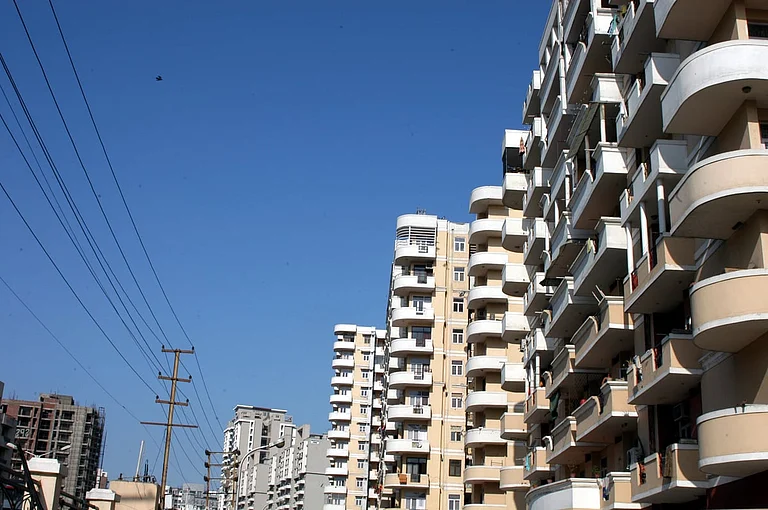The Indian stock market closed flat with a slight negative bias on Friday, February 22. The Nifty50 index closed at 22,795.9 levels down by 0.51 per cent or 117.25 points and the Sensex closed at 75,311.06 levels down by 424.9 points or 0.56 per cent.
Nifty Realty Falls Nearly 30 Per Cent From 52-Week High: Know Which Stocks Were Worst Hit
As the benchmark indices ended lower the Nifty Realty index also closed in the red for the second straight session down by 1.27 per cent. At its current level, the index is trading nearly 27 per cent lower from its 52-week high. Notably, if an index falls over 20 per cent from its 52-week high, it is said that the index has crashed and has entered bear territory. On a year-to-date basis, the index has fallen 18.85 per cent
As the benchmark indices ended lower the Nifty Realty index also closed in the red for the second straight session down by 1.27 per cent. At its current level, the index is trading nearly 27 per cent lower from its 52-week high. Notably, if an index falls over 20 per cent from its 52-week high, it is said that the index has crashed and has entered bear territory. On a year-to-date basis, the index has fallen 18.85 per cent.
Which Stocks Were Worst Hit
Earlier in 2024, the index hit a 52-week high on June 18 trading at 1,157.35 levels. In the eight months following the index hitting its 52-week high all ten constituents of the index have declined between 17 per cent and 58 per cent.
Phoenix Mills was the worst hit as shares of the company declined 58.6 per cent in the eight months as the stock fell from its June 18 level of Rs 3804.55 apiece to Rs 1,575 on February 21.
Sobha Realty shares also bore the brunt of the bear-run in the eight months between June 18 and February 22. The stock last traded at Rs 1,185 on February 21, falling 45.13 per cent from its June 18 price of Rs 2,159.7 apiece.
Shares of Mahindra group company, Mahindra Lifespace Developers Ltd also witnessed a significant decline from its June 18 level of Rs 636.15 apiece as it fell 44.66 per cent to close at Rs 352 apiece on February 21.
Shares of Raymond, Prestige Estates and Godrej Properties fell between 35.8 per cent and 44.48 per cent in the eight-month period. Realty stocks such as Brigade, Lodha, DLF and Oberoi Realty fell between 26 per cent and 17.51 per cent.
Why Are Realty Stocks Declining
Factors such as a moderation in housing sales during the December quarter, and a growth slowdown in the economy, have affected investor sentiment. This has contributed to the sell-off in realty stocks.
Bhavya Shah, Head of Research at Wallfort PMS, told Outlook Money that the Nifty Realty index has corrected following the three years of high returns seen in the real estate sector. Shah added that high interest rates on home loans, rising cost of living and increasing property prices are pushing out the middle class as buyers and impacting the performance of the stocks.
“The correction has come on the backdrop of high returns the real estate stocks have delivered over the past 3 years. The concerning factors at present are high interest rates on home loans, rising cost of living, consistently increasing property prices pushing out the middle class as a potential buyer,” Shah said.
PropEquity, a platform that provides real estate data, analytics, and market research reports estimated that housing sales fell by 21 per cent annually across nine major metropolitan cities during the October-December period The company added that out of the top nine housing markets—Delhi-NCR, Mumbai, Navi Mumbai, Kolkata, Bengaluru, Pune, Hyderabad, Chennai, and Thane only in Delhi-NCR experienced sales growth.
Shah projected that a bounce back in Nifty Realty’s performance is likely in the near term. Shah added that a strong trend reversal will still depend on factors such as the interest rates on home loans, and the affordability of real estate.
“We may see a bounce back of Nifty Realty in the near term, however, the strong trend reversal will depend on the direction of interest rates, and affordability of real estate to the middle and upper-middle-class segment which is necessary for a rebound in overall sales growth of real estate sector,” Shah said.
Shah also added that a reversal in the Nifty Realty index also relies on the RBI’s approach towards rate cuts in the near term. Notably, the RBI cut the repo rate by 25 basis points earlier on February 7, marking the first rate cut in nearly five years.
“On February 7, 2025, the Reserve Bank of India (RBI) reduced the repo rate by 25 basis points, from 6.50% to 6.25%. This marks the first rate cut in nearly five years. If RBI follows up the approach on rate cut this will definitely help in sustainable recovery,” Shah said.


